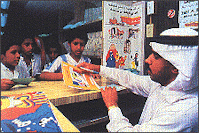|
|
Introduction
 |
|
At the time the Kingdom of Saudi Arabia was founded in 1932, education was not accessible to everyone and limited to individualized instruction at religious schools in mosques in urban areas. These schools taught Islamic law and basic literacy skills. A little over 60 years later, Saudi Arabia now has a nationwide educational system that provides free training from preschool through university to all citizens. While the study of Islam remains at its core, the modern Saudi educational system provides quality instruction in diverse fields of modern and traditional arts and sciences. This diversity helps meet the Kingdom's growing need for highly-educated citizens to build on its rapid progress of the past few decades.
Formal primary education began in Saudi Arabia in the 1930s. By 1945, King Abdul Aziz Bin Abdul Rahman Al-Saud, the country's founder, had initiated an extensive program to establish schools in the Kingdom. Six years later, in 1951, the country had 226 schools with 29,887 students. In 1954, the Ministry of Education was established, headed by then Prince Fahd Bin Abdul Aziz as the first Minister of Education. The first university, now known as King Saud University, was founded in Riyadh in 1957.
Today, Saudi Arabia's nationwide educational system comprises seven universities, 83 colleges and more than 18,000 schools. Open to every citizen, the system provides students with free education. books and health services. A measure of the government's substantial commitment to this sector is the allocation of approximately 19 percent of expenditure, or 37.5 billion U.S. dollars, to education and human resources under the Fifth Development Plan (1990-94).
Saudi Arabia prizes education because of its critical importance in developing the human potential of the country. As the leader of his nation, the Custodian of the Two Holy Mosques King Fahd Bin Abdul Aziz has often stressed how the youth of Saudi Arabia is the country's most valuable resource. Education is a central aspect of family and community life. Parents are deeply involved in their children's education, and the close links between home and school serve to reinforce the structure of the community and the nation.
.
|